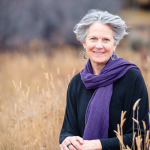Branham: We are the ones we’ve been waiting for
Aspen Times Columnist

Courtesy photo
I was pleasantly surprised by the turnout at Paepcke Park on Saturday for the No Kings March. At least 400 people gathered with a zest of possibility. An air of resistance. Cheeky signs and big grins created a pocket of levity in this extremely tense political moment.
What if we are not alone in our yearning for equity, justice, and liberty? What if others want the same thing we do? Imagine that?
That’s the power of a rally. An embodied reminder, amidst the slop of information, misinformation, and AI-generated disinformation, that there are a lot of real human beings out there who hold the same values.
On the heels of this latest gathering, with estimates of around seven million attendees, combined with the June No Kings June protests, tallying up at nearly five million in attendance, I keep asking myself: Will this make change? Is this a political tactic that will work?
I look at other countries who have been successful in thwarting authoritarian rule. In South Korea in 2024, in response to President Yoon Suk Yeol’s declaration of martial law to suppress political activity and the press, thousands of ordinary citizens and politicians from both major parties gathered in force. Risking arrest, National Assembly members even scrambled over fences to get inside for a quorum and protestors blocked armored vehicles. They put their bodies on the line in a very real way.
Mr. Yoon was left with no choice but to declare martial law over. Turns out that the majority of Koreans understood democracy. They were paying attention.
Are we?
Where else are we seeing a President attempt to “justify” using the military as a tactic to eliminate opposition? Right here. In the last few months, Trump has deployed the national guard to five major Democratic-led U.S. cities: Washington, D.C.; Los Angeles, California; Portland, Oregon; Chicago, Illinois; and Memphis, Tennessee — all under the guise of cracking down on crime.
The result is increased chaos and tension. Not the stamping out of crime. Rather, these acts are a match. This is intentional.
And this is the context we are in. Amidst a government shutdown, science continues to get attacked and worse, public funding is vanishing, environmental protections are being rolled back, and in response to peaceful protests across the country, the President responded with an AI-generated video of himself defecating, yes, you read that correctly, over his own constituents.
It’s enough to make my head spin or explode. The existential horrors mixed with daily stories of undocumented people being ripped right off the streets or from their homes, zip-tied and disappeared, should absolutely make us march.
But one show of resistance is not going to be enough. Of, course it won’t. But what will be?
One gift of the march was strengthened, local, social ties. There have been myriad studies that point to the causal link between the strength of social bonds and pro-social behavior. Our best bet to resist authoritarianism, underscores Timothy Snyder, academic and author of “On Tyranny,” is the vital defense of human relationships. Strong community bonds counteract authoritarianism’s destruction of social fabric by fostering good things: trust, empathy, and collective resilience.
At the rally, I made eye contact with people I didn’t know, shook hands, complimented signs. This, I now see, is part of how we resist. We do good together. We remember we can.
It really is up to us, as a community, to meet each other’s physical, social, and emotional needs. Our dignity and humanity depend on it. Building up our civil society is our inoculation strategy. From these bonds, a groundswell of incisive, effective civic engagement and collective action become plausible.
For example, if I want to see more affordable housing, employment opportunities, and climate protection in this valley, I need to be part of the fabric of relationships that can catalyze systemic change. It will take much more than one rally. It may take a lifetime. But I certainly cannot do it alone.
As the poet June Jordan writes, “we are the ones we’ve been waiting for.”
And yes, that means you.
Dr. Lindsay Branham is an environmental psychologist, scholar, author, and Emmy-nominated filmmaker whose work explores embodied kinship between humans and the Earth. Subscribe to her Substack at lindsaybranham.substack.com.
Branham: We are the ones we’ve been waiting for
I was pleasantly surprised by the turnout at Paepcke Park on Saturday for the No Kings March.









